The history of yeovil's pubs
PUBS HOME PAGE |
PUBS INTRODUCTION |
PUBS BY NAME |
BEERHOUSES |
alexandra hotel
13-15 South Western Terrace
 Although
the
railway came
to Yeovil in
1853 (the first
station being at
Hendford) Yeovil
Town Station,
shown below, was
the last of
Yeovil's four
railway stations
to be built and
opened in 1861
(finally closing
in 1966 for
passengers and
1967 for goods).
In 1885, the
Alexandra Hotel
(shown pink on
the map at left)
along with the
rest of South
Western Terrace, was built
by
Levi Ridout
in
its prime
location to
accommodate
railway
travellers. A
large, imposing
building on a
corner site and
built to
directly face
the station and
impress
travellers - for
many of whom it
would be their
first impression
of Yeovil.
Although
the
railway came
to Yeovil in
1853 (the first
station being at
Hendford) Yeovil
Town Station,
shown below, was
the last of
Yeovil's four
railway stations
to be built and
opened in 1861
(finally closing
in 1966 for
passengers and
1967 for goods).
In 1885, the
Alexandra Hotel
(shown pink on
the map at left)
along with the
rest of South
Western Terrace, was built
by
Levi Ridout
in
its prime
location to
accommodate
railway
travellers. A
large, imposing
building on a
corner site and
built to
directly face
the station and
impress
travellers - for
many of whom it
would be their
first impression
of Yeovil.
Built of ashlar under a slate roof it is three storeys as it wraps around the corner but reduces to two storeys with dormered attic rooms as it continues east along the rising ground towards Newton Road. The main entrance is on the corner with a flat portico supported by a pair of Doric columns and reached by a short flight of steps. At the start of the two storey section a porte cochere gave entrance to some stabling at the rear and a long service alley, actually named Coldharbour Lane, that connected with Middle Street.
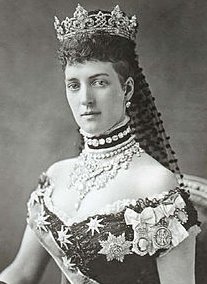 Of interest, in
connection with
the stabling, an
advertisement in
Whitby's Yeovil
Almanack
Advertiser below states "Waggonettes,
Dog Carts, Open
& Close
Carriages,
Stabling and
Loose Boxes for
Hunters. Saddle
Horses and
Hunters for
Hire". Also of
interest in the
same
advertisement is
the statement
"Nearest House
to the Joint
Stations" being
a reference to
the fact that
two railway
companies used
the Yeovil Town
Station and each
had their own
Station Master!
Of interest, in
connection with
the stabling, an
advertisement in
Whitby's Yeovil
Almanack
Advertiser below states "Waggonettes,
Dog Carts, Open
& Close
Carriages,
Stabling and
Loose Boxes for
Hunters. Saddle
Horses and
Hunters for
Hire". Also of
interest in the
same
advertisement is
the statement
"Nearest House
to the Joint
Stations" being
a reference to
the fact that
two railway
companies used
the Yeovil Town
Station and each
had their own
Station Master!
The new hotel was named, in a flurry of patriotism, after the popular Princess Alexandra of Denmark (1844-1925), photographed at left, became the consort of King Edward VII when they married in March 1863, shortly before the hotel opened. She was queen consort and Empress of India from 1901 to 1910
|
At right is a public house 'check' or trade token issued at the Alexandra Hotel during the period LC Smith was licensee - roughly between 1936 and 1947. It is made of brass, 24.5mm in diameter and with a plain edge. On the obverse it says "LC SMITH, ALEXANDER (note the spelling mistake) HOTEL, YEOVIL" and on the reverse is its value - 6D. |
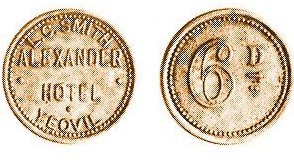 |
At this time sixpence could buy you a roast beef dinner with vegetables or 2½ pints of stout. Checks were frequently used in games, such as skittles or quoits where, for instance, players would 'chip in' a check to the 'kitty' which would be won by the winning team to redeem at the bar. By issuing checks a landlord could guarantee they would be spent in his establishment only.
At the rear of the Alexandra, in the alley earlier known as Coldharbour Lane, was a stable block and a coach house. These were converted into a skittle alley in 1933.
|
Yeovilians
remember... |
![]()
The first listed licensee of the Alexandra Hotel in 1871, Horace E Venner, of Dover, Kent, was only 26 years old when he became the hotel keeper with his wife Elizabeth. By 1881 he and his small family had moved to Staffordshire where he worked as a railway clerk. He was followed briefly, in 1875, by Robert McAuley who was not resident in Somerset in either 1871 or 1881.
The next licensee was Charles Warr and his wife, Jane. Charles had been born in 1844 at the hamlet of Alvington, just outside Yeovil and Jane hailed from Dorset. They were still in residence ten years later and the 1891 census shows there was also a general servant, Elizabeth Pittman, and an ostler, William Drury, living in. By 1901 Charles and Jane were living in Alvington where he was listed in the census as a farmer.
Wincanton-born James Whensley and his wife, Margaret, were the next tenants. In the 1901 census they are shown with their four children and James' sister, Mary, as well as Annie Hooper, a general domestic servant, and ostler Harry Shepard. James died around 1902 and Margaret assumed the license until 1905.
In the 1911 census, 27-year old Ethel Emma Hardyman was described as the hotel's proprietress. She was the wife of Thomas Frederick Hardyman, known as Fred, who was the foundry manager at the Petter's Westland site.
Sketch Plans of the Alexandra Hotel
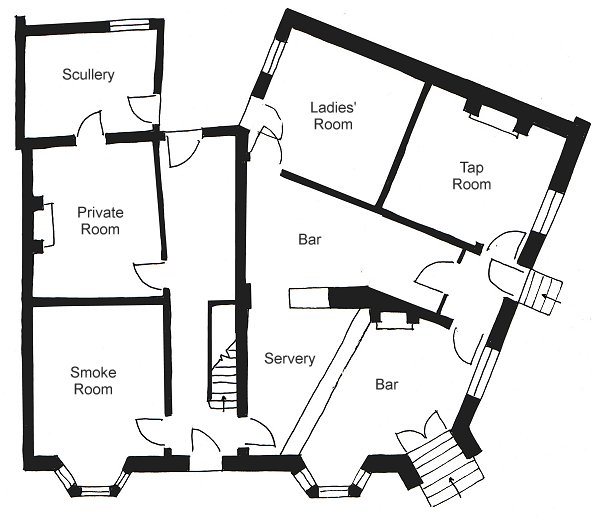
This is a sketch based on plans held at the Heritage Centre, Taunton. The original plans are undated but are probably from the 1930s when J Brutton & Sons Ltd were the owners. The plans were submitted at the time of the alterations to extend the bar area as shown below.
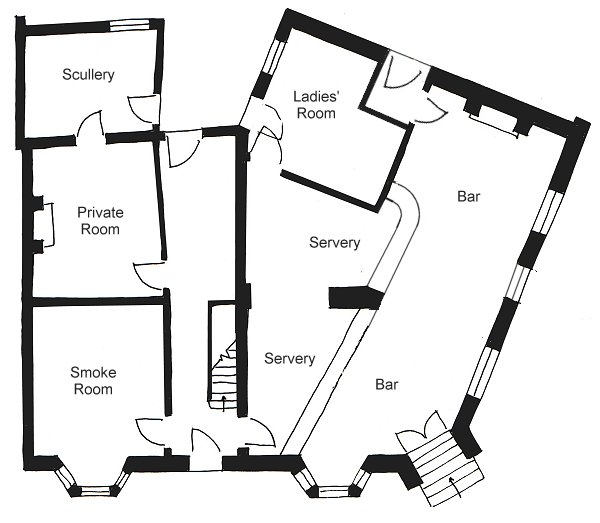
gallery
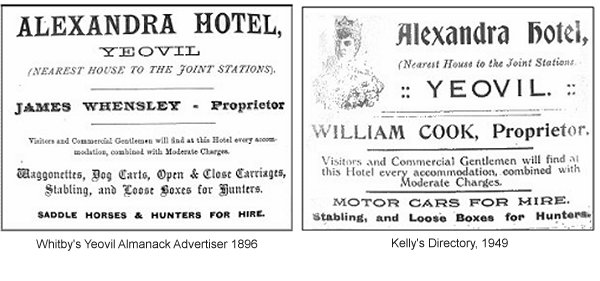
The wording changed very little in the fifty-plus years in these advertisements for the Alexandra Hotel, the only leaning to modernity being waggonettes, dog carts, etc. being replaced by motor cars, but they still offered stabling for your hunter!

Taken about 1880, this photograph shows the proximity of the Alexandra Hotel, at top left, to the Yeovil Town railway station.
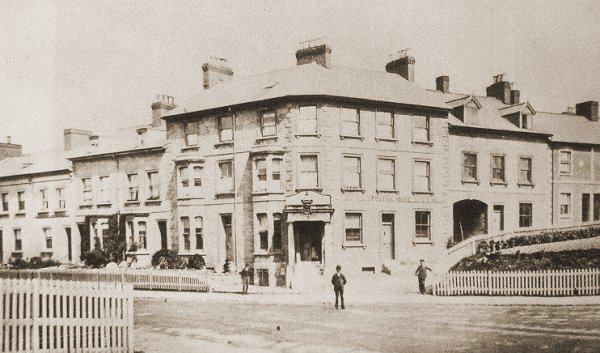
This
photograph
features in my
book 'Yeovil From Old Photographs'.
This photograph, taken some five years later, shows the Alexandra Hotel in more detail. Notice that, although the buildings at right had been built, the road itself had not yet been fully constructed and was the remnants of Dodham Lane. At this time the road at left, now Old Station Road, was called Station Road. The terrace of buildings is South Western Terrace - all built by local builder Levi Ridout.

James Whensley died around 1902 and his widow, Margaret, assumed the license until 1905. This is her advertisement in the 1905 edition of the Western Gazette Almanac.
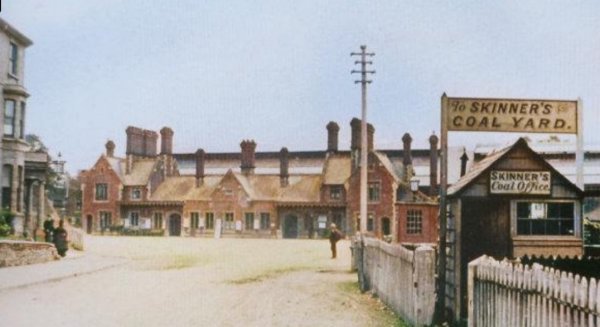
This
image
features in my
book 'Yeovil
- The Postcard
Collection'.
This colourised photograph, taken around 1910, looks down Station Road (now Old Station Road) to Yeovil Town Railway Station with the corner of the Alexandra Hotel at left and Skinner's Coal Yard at right. William Skinner had originally kept a beerhouse in Middle Street.
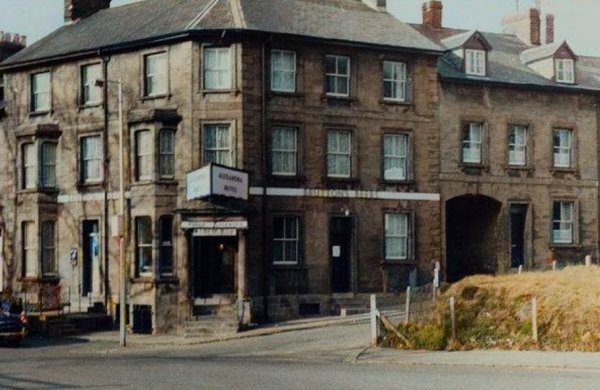
This colourised photograph of the Alexandra Hotel, is thought to have been taken in the 1950s.
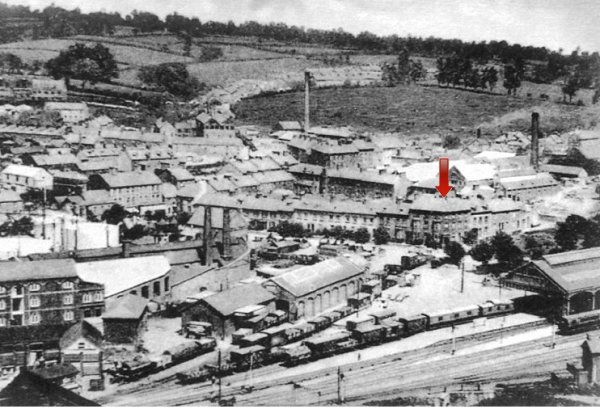
A panorama taken from Summerhouse Hill around 1910 showing the Alexandra Hotel, arrowed, in its setting at the edge of the town and its proximity to the town railway station. Notice, however, the proximity of the open countryside to the town - all those fields are now built on.
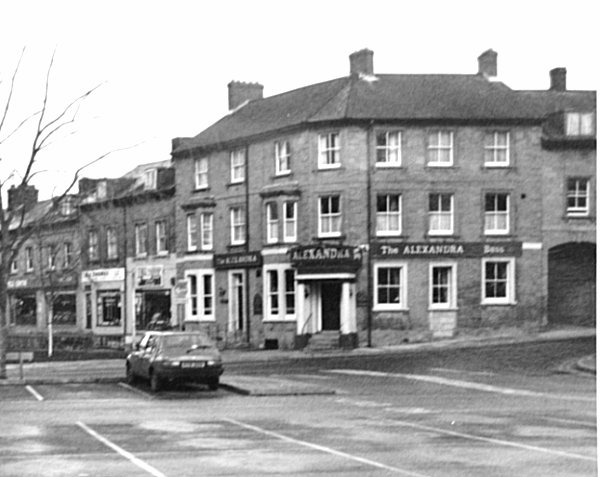
Courtesy of
Chris Rendell
The Alexandra, seen from Old Town Station car park and photographed in 1985.
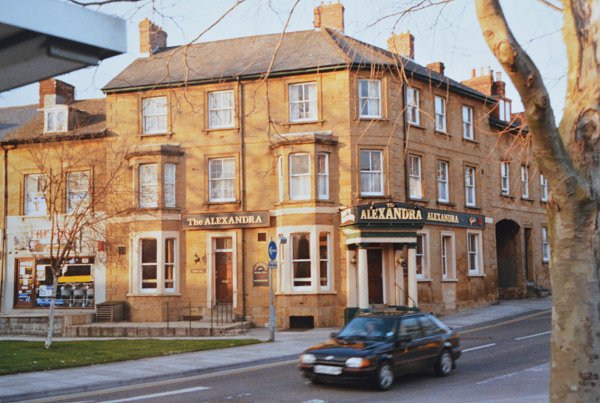
Courtesy of
Chris Rendell
In its guise as The Alexandra, photographed in 1989.

In its guise as the less formal Alex during the 1990s - before Malee Thai took over the building at centre and the Yeovil Bicycle Centre was where Tamburino's is today.
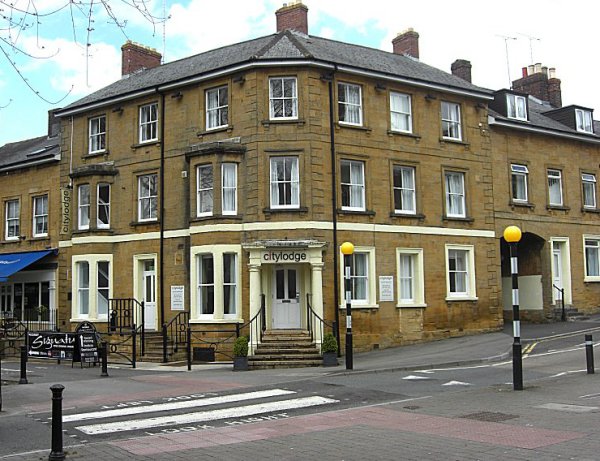
Photographed in 2012, the Alexandra Hotel is now a CityLodge.
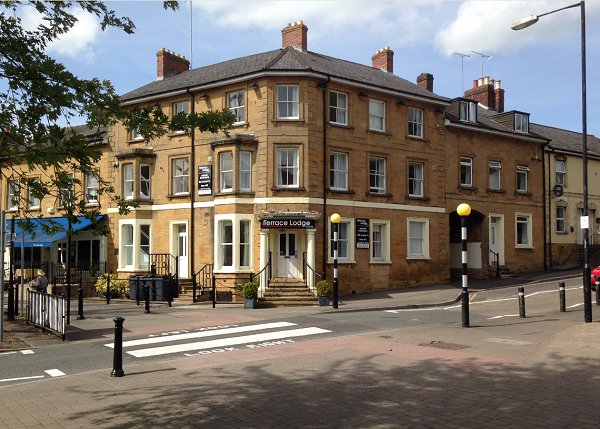
.... and by 2015 had become Terrace Lodge.
licensees
1871 – Horace
Venner –
Hotel-Keeper
(1871 census)
listed as
Alexandra Hotel
1875 – Robert
McAulay (P.O.
Directory 1875)
1875 – Robert
McAulay (Kelly's
1875 Directory -
Hotels & Inns)
1881 – Charles
Warr – Inn
Keeper (1881
census) listed
as Alexandra
Hotel
1882 – Charles
Warr (Whitby's
Yeovil Almanack
Advertiser 1882)
1890 – Charles
Ware (Kelly's
1890 Directory)
1891 – Charles
Warr – Hotel
Keeper (1891
census) listed
as Alexandra Inn
1892 – James
Whensley –
license transfer
(Borough Petty
Sessions)
1894 – James
Whensley –
Proprietor
(Western Gazette
Almanac)
1895 – James
Whensley
(Kelly’s 1895
Directory)
listed as
Alexandra Hotel
1901 – James
Whensley – Hotel
Proprietor (1901
census) listed
as Alexandra
Hotel
1902 – James
Whensley
(Western Gazette
Almanac 1902)
1903 – Mrs
Whensley –
Proprietress
(Whitby's Yeovil
Almanack
Advertiser 1903)
1905 – Margaret
Flora Whensley
(Western Gazette
Almanac)
1906 – William T
Bruce (Western
Gazette Almanac
1906)
1910 – William T
Bruce (Western
Gazette Almanac
1910)
1911 – Ethel
Emma Hardyman -
remarried widow
of William Bruce (1911
census)
listed as Hotel
1923 – William
Cook (Kelly’s
1923 Directory)
listed as
Alexandra Hotel
1936 – LC Smith
(1936 Yeovil
Directory)
listed as
Alexandra Hotel
1938 – LC Smith
(1938 Yeovil
Directory)
listed as
Alexandra Hotel
1939 – LC Smith
- Proprietor
(Kelly’s 1939
Directory)
listed as
Alexandra Hotel
1947 – LC Smith
(1947 Yeovil
Directory)
listed as
Alexandra Hotel
1949 – C
Cook (Kelly’s
1949 Directory)
listed as
Alexandra Hotel
1954 – C Cook
(1954 Yeovil
Directory)
listed as
Alexandra Hotel
1957 – C Cook
(1957 Yeovil
Directory)
listed as
Alexandra Hotel
1960 – E Call
1965 – Licensee
not named (1965
Yeovil
Directory)
listed as
Alexandra Hotel
1968 – Licensee
not named
(Kelly’s 1968
Directory)
listed as
Alexandra Tavern
1969 – Licensee
not named
(Kelly’s 1969
Directory)
listed as
Alexandra Tavern
1970 – Licensee
not named
(Kelly’s 1970
Directory)
listed as
Alexandra Tavern
1971 – Licensee
not named
(Kelly’s 1971
Directory)
listed as
Alexandra Tavern
1972 – Licensee
not named
(Kelly’s 1972
Directory)
listed as
Alexandra Tavern
1973 – Licensee
not named
(Kelly’s 1973
Directory)
listed as
Alexandra Tavern
1974 – Licensee
not named (1974
Yeovil
Directory)
listed as
Alexandra Tavern